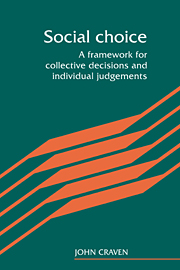7 - Rights
Published online by Cambridge University Press: 15 September 2009
Summary
Arrow's theorem is the consequence of attempts to find a satisfactory alternative to majority voting that avoids the voting paradox. The theorems that we have met in the last four chapters demonstrate that all social choice rules have their drawbacks – generally, those proposed violate independence (or give incentives not to tell the truth), or do not give rational social choices in some defined sense, or, like majority voting, they do not ‘work’ for some combinations of individual preferences.
Even beyond these objections, it is possible that a social choice rule such as majority voting gives undesirable outcomes even in circumstances where it works. For example, the unrestrained use of majority voting may be objectionable because a majority might choose an alternative that has severe effects on a minority; it is an all-too-frequent lesson of history that minorities have suffered at the hands of majorities (the opposite happens too, and is equally covered by what follows). People have different views of what constitutes an individual's rights – ranging from the right not to suffer physical harm through to the libertarian economic view that people have the right to keep – and hence not be taxed on – their income and wealth.
- Type
- Chapter
- Information
- Social ChoiceA Framework for Collective Decisions and Individual Judgements, pp. 107 - 122Publisher: Cambridge University PressPrint publication year: 1992



